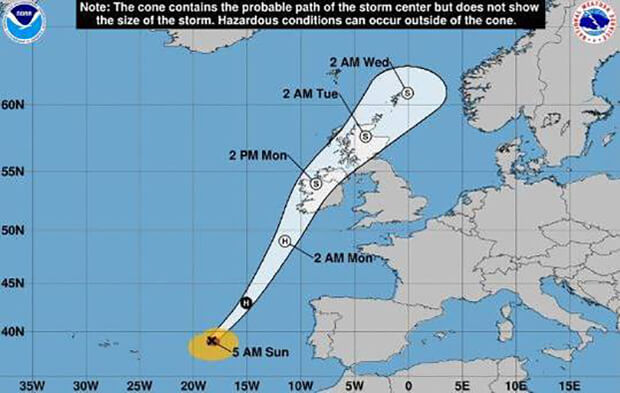Hurricane Ophelia. Prepare to stay safe

Hurricane Ophelia has made landfall this morning in the South of Ireland so its important for all motorists and especially pedestrians and cyclists to stay safe.
Met Éireann has confirmed that Ophelia is the most powerful hurricane to have ever been this far east in the Atlantic on record and it is Ireland’s first ever recorded hurricane.
Hurricane Ophelia became a rare category 3 hurricane near the Azores and is the sixth major hurricane of the Atlantic season.
It has, however, been downgraded to a tropical storm as it hit Ireland this morning. Although it is technically not classed as a hurricane as the sea temperature beneath it needs to be a warm 26 degrees, it is still as powerful.
The wind speeds are expected to reach 80km/hr with gusts over 150km/hr. Heavy rain of up 100mm and storm surges may cause flooding in some areas. There is also predicted structural damage.
The authorities have mobilised emergency response teams are hopeful the country will escape the worst. Met Eireann will be tracking the storm over the next 24 hours.
The eye of the storm has hit the south coast and is tracking its way up along the west coast.
The coastal counties from Wexford and Waterford around as far as Galway and Mayo will experience the highest winds.
It is the first time that Ireland has seen a countrywide severe red weather alert which is the highest warning. The issue of red level severe weather warnings is a comparatively rare event and implies that people take action to protect themselves and/or their properties.
This could be by moving their families out of the danger zone temporarily, staying indoors, or by other specific actions aimed at mitigating the effects of the weather conditions.
Homeowners are advised to protect their property and sandbags have been distributed in some areas.
AA spokesman Conor Faughnan had this advice for keeping your home safe before the storm hits:
- Clear drains which ca block quickly in heavy rain and cause flooding indoors.
- Clear any furniture or lose items from the garden to prevent loose debris from smashing windows.
- Ensure windows are properly closed and secure during the storm.
- If possible, have someone home to monitor alarm systems which AA expects to go off during high winds.
- Sweep away loose leaves in the garden to prevent drains from blocking.
- For motorists, they advise avoiding travel where possible in affected areas and to drive with caution and watch out for fallen debris when on the road.
The Irish Coast Guard has strongly advised the public to avoid coastal areas until the storm passes and to call 112 if you spot someone in trouble.
Avoid cliffs, piers, harbour walls, beaches and promenades.
"With the onset of Hurricane Ophelia the Coast Guard is requesting members of the public to avoid any visits or walks to coastal or cliff areas,"
"The storm is expected to be at its most severe from Monday morning with SW and West coast areas expected to experience the brunt of the storm.
"The Coast Guard is reminding the public of the dangers of visiting exposed coastal areas and to adhere to the core message of; Stay Back, Stay High, Stay Dry."
Dublin Airport has advised all passengers to check with their airline before flying into Dublin Airport or departing from all Irish airports.
Bus Eireann has cancelled school bus services and the Department of Education has advised schools to remain closed.
ESB is providing real-time information on power outages here and AA Roadwatch has advised motorists to "drive with extreme care".
Wind-blown debris is likely to be a problem on secondary roads in particular. Keep in mind that high-sided vehicles are especially vulnerable on open roads.
Environment Minister Denis Naughten yesterday warned that the country should prepare for more
"very severe" storms which will "ravage through people's homes".
"You are going to see an increased frequency of extreme weather conditions like the 100-year floods happening every five or six years," Mr Naughten told the Sunday Independent.

Author

Justin Kavanagh
Justin Kavanagh is a recognised leader
in automotive intelligence and vehicle
data supply to the entire motor industry.
He has almost 20 years experience in
building systems from the ground up.
As the Managing Director of Vehicle
Management System, he understands the
need and importance of trustworthy and
reliable vehicle history and advice to
both the trade and the public.
Follow me on LinkedIn